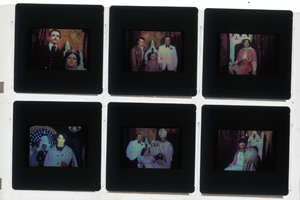March 19, 2014
 Event: Carnegie Mellon University's Center for the Arts in Society (CAS) will host the Pittsburgh Queer History Project's inaugural event, a lecture on "Lucky After Dark" by CMU's Timothy Haggerty and Harrison Apple.
Event: Carnegie Mellon University's Center for the Arts in Society (CAS) will host the Pittsburgh Queer History Project's inaugural event, a lecture on "Lucky After Dark" by CMU's Timothy Haggerty and Harrison Apple.
Directed by Haggerty and CAS artist-in-residence Harrison Apple, a 2013 graduate of CMU's Intercollege Degree Program, the Pittsburgh Queer History Project is an oral history and media preservation initiative dedicated to investigating and revealing queer life histories and community formations in Pittsburgh. The "Lucky After Dark" lecture will preview a June 2014 exhibit of the same name that will explore the role after-hours nightlife in postwar Pittsburgh played in establishing and shaping gay and lesbian identities.
"Invisibility still dominates the discussion of LGBT community formation in the 20th century," said Haggerty, director of the Humanities Scholars Program and a leading expert on cultural roles for men and policy issues concerning sexuality. "Assumptions that 'gay life' evolved in San Francisco, New York or LA while smaller cities lagged behind or remained off-the-grid are rebuked by the example of Pittsburgh, where a subculture evolved in reaction to local conditions and opportunities."
Haggerty and Apple will discuss how they have uncovered and are documenting an expansive archive of photographs, videos, publications and accounts of how the private social clubs became centers for illicit behavior, including the world of same-sex relationships and other underground economies.
Apple, who founded the Pittsburgh Queer History Project, said the most challenging thing about "Lucky After Dark" has been figuring out how to organize the extraordinary amount of documentation collected.
"We're dealing with a lot of visual memory materials and doing our best to bring people around to figure out what was going on at the particular moment that was captured," Apple said. "The exhibit needs to represent people and situations fairly as well as be made legible for a younger generation who can now see it as part of their own past."
The CAS is a research center in the Dietrich College of Humanities and Social Sciences and College of Fine Arts that explores the role of the arts in society. For more information, visit http://www.cmu.edu/cas/.
When: THIS LECTURE HAS BEEN POSTPONED TO: 4:30 p.m., TUESDAY, April 29
Where: Giant Eagle Auditorium, Baker Hall, Carnegie Mellon University
###
Pictured above are some of the photographs collected from social clubs that became centers for same-sex relationships and other underground activities.
Media Advisory: Carnegie Mellon To Host Pittsburgh Queer History Project's Inaugural Lecture, "Lucky After Dark"
Contact: Shilo Rea / 412-268-6094 / shilo@cmu.edu Event: Carnegie Mellon University's Center for the Arts in Society (CAS) will host the Pittsburgh Queer History Project's inaugural event, a lecture on "Lucky After Dark" by CMU's Timothy Haggerty and Harrison Apple.
Event: Carnegie Mellon University's Center for the Arts in Society (CAS) will host the Pittsburgh Queer History Project's inaugural event, a lecture on "Lucky After Dark" by CMU's Timothy Haggerty and Harrison Apple. Directed by Haggerty and CAS artist-in-residence Harrison Apple, a 2013 graduate of CMU's Intercollege Degree Program, the Pittsburgh Queer History Project is an oral history and media preservation initiative dedicated to investigating and revealing queer life histories and community formations in Pittsburgh. The "Lucky After Dark" lecture will preview a June 2014 exhibit of the same name that will explore the role after-hours nightlife in postwar Pittsburgh played in establishing and shaping gay and lesbian identities.
"Invisibility still dominates the discussion of LGBT community formation in the 20th century," said Haggerty, director of the Humanities Scholars Program and a leading expert on cultural roles for men and policy issues concerning sexuality. "Assumptions that 'gay life' evolved in San Francisco, New York or LA while smaller cities lagged behind or remained off-the-grid are rebuked by the example of Pittsburgh, where a subculture evolved in reaction to local conditions and opportunities."
Haggerty and Apple will discuss how they have uncovered and are documenting an expansive archive of photographs, videos, publications and accounts of how the private social clubs became centers for illicit behavior, including the world of same-sex relationships and other underground economies.
Apple, who founded the Pittsburgh Queer History Project, said the most challenging thing about "Lucky After Dark" has been figuring out how to organize the extraordinary amount of documentation collected.
"We're dealing with a lot of visual memory materials and doing our best to bring people around to figure out what was going on at the particular moment that was captured," Apple said. "The exhibit needs to represent people and situations fairly as well as be made legible for a younger generation who can now see it as part of their own past."
The CAS is a research center in the Dietrich College of Humanities and Social Sciences and College of Fine Arts that explores the role of the arts in society. For more information, visit http://www.cmu.edu/cas/.
When: THIS LECTURE HAS BEEN POSTPONED TO: 4:30 p.m., TUESDAY, April 29
Where: Giant Eagle Auditorium, Baker Hall, Carnegie Mellon University
###
Pictured above are some of the photographs collected from social clubs that became centers for same-sex relationships and other underground activities.